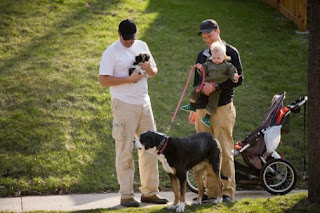Halloween is a fun time of year for both adults and children…costumes, decorations, creepy music, and trick or treating! Unfortunately, this holiday can also spell trouble for your pets if you’re not careful to protect them. Here’s how:
1) Making your own costume or decorating for a party? Place all those craft supplies in a safe spot so your pet doesn’t play with, ingest or choke on them. Also keep an eye on your pet’s reaction to any costumes. If he can’t handle it at home, he definitely won’t be able to enjoy a night of trick or treating.
2) If you go trick or treating, stay with your pet at all times or leave him at home. We all know Halloween is a night of mischief, which unfortunately can mean that pets get teased or injured. Black cats are especially prone to poor treatment. If you bring your dog trick or treating, make sure he is well-fed, well-socialized, and on-leash at all times. Cats are best kept indoors.
3) If you are handing out candy at your house, keep pets away from young children who come to the door. If your pet shows any signs of fear or aggression due to all the stimulation of costumes, strangers and unusual activity in his home, take him to a quiet, safe place for some alone time.
4) After you’ve collected your goodies, keep it out of reach. Chocolate and artificial sweeteners found in many candies, as well as wrappers, can be poisonous to pets. Instead, offer your pet a store-bought dog or cat treat so he doesn’t feel left out!
 Whether your pet is gung-ho to enjoy all the Halloween festivities or drawn to solitude, you can make it a safe and enjoyable evening by following these simple suggestions.
Whether your pet is gung-ho to enjoy all the Halloween festivities or drawn to solitude, you can make it a safe and enjoyable evening by following these simple suggestions. Happy Halloween!
















